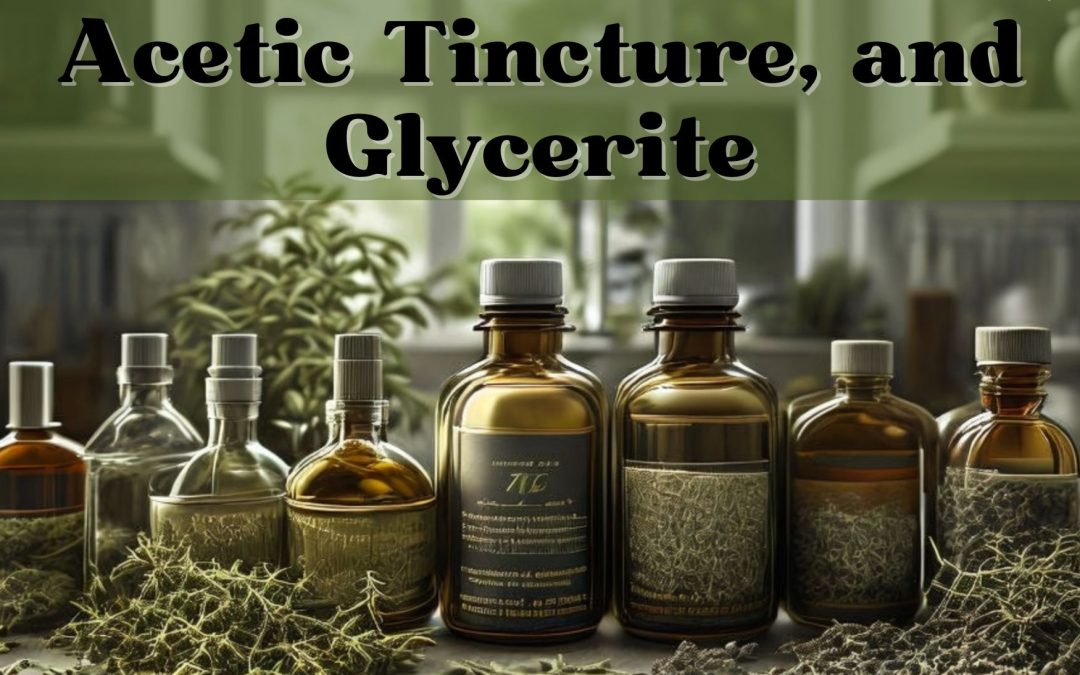This post may contain affiliate links, to learn more about them, check out our Disclosure.
When diving into the world of herbal medicine, you’ll often encounter terms like tincture, acetic tincture, and glycerite. Each of these herbal preparations offers unique benefits, and understanding their differences can help you choose the best method for your needs. So today we are going to go over the key differences between a tincture, Acetic Tincture and a Glycerite.
What is a Tincture?
A tincture is a concentrated herbal extract made by soaking plant material in alcohol. The alcohol acts as a solvent, extracting the active compounds from the herbs. Tinctures are known for their potency and long shelf life, making them a popular choice for herbal remedies.
Pros of Tinctures:
- Potency: Tinctures are highly concentrated, allowing for small dosages.
- Shelf Life: Alcohol acts as a preservative, giving tinctures a shelf life of several years.
- Efficiency: Alcohol extracts a wide range of compounds, including both water-soluble and alcohol-soluble components.
Cons of Tinctures:
- Alcohol Content: Not suitable for everyone, especially children, pregnant women, or those avoiding alcohol.
- Taste: The alcohol can impart a strong, sometimes unpleasant taste.
Basic Tincture Recipe:
Ingredients:
- 1 part dried herbs (e.g., echinacea, valerian root)
- 4 parts high-proof alcohol (vodka or brandy)
Instructions:
- Place the dried herbs in a glass jar.
- Pour the alcohol over the herbs, ensuring they are fully submerged.
- Seal the jar tightly and store it in a cool, dark place for 4-6 weeks.
- Shake the jar daily to help the extraction process.
- After 4-6 weeks, strain the liquid through a cheesecloth or fine mesh strainer into a clean jar.
- Store your tincture in a dark glass bottle away from light and heat.
What is an Acetic Tincture?
An acetic tincture, also known as a vinegar tincture, is similar to a traditional tincture but uses vinegar (usually apple cider vinegar) instead of alcohol as the solvent. This method is ideal for those who prefer to avoid alcohol.
Pros of Acetic Tinctures:
- Non-Alcoholic: Safe for individuals who avoid alcohol.
- Digestive Benefits: Vinegar has its own health benefits, including aiding digestion and balancing pH levels.
- Mild Taste: Generally milder and more palatable than alcohol-based tinctures.
Cons of Acetic Tinctures:
- Lower Potency: Vinegar may not extract as many compounds as alcohol, resulting in a less potent tincture.
- Shorter Shelf Life: Vinegar-based tinctures have a shorter shelf life, usually around 6-12 months.
Basic Acetic Tincture Recipe:
Ingredients:
- 1 part dried herbs (e.g., dandelion root, nettle)
- 4 parts apple cider vinegar
Instructions:
- Place the dried herbs in a glass jar.
- Pour the apple cider vinegar over the herbs, ensuring they are fully submerged.
- Seal the jar tightly and store it in a cool, dark place for 4-6 weeks.
- Shake the jar daily to help with the extraction.
- After 4-6 weeks, strain the liquid through a cheesecloth or fine mesh strainer into a clean jar.
- Store your acetic tincture in a dark glass bottle and refrigerate to extend shelf life.
What is a Glycerite?
A glycerite is an herbal extract made using vegetable glycerin as the solvent. Glycerin is a sweet, syrupy liquid derived from plants and is an excellent alternative for those who prefer a non-alcoholic and sweeter preparation.
Pros of Glycerites:
- Non-Alcoholic: Safe for children, pregnant women, and those avoiding alcohol.
- Sweet Taste: Naturally sweet, making it more palatable for most people.
- Skin-Friendly: Glycerites can be used both internally and externally.
Cons of Glycerites:
- Lower Potency: Glycerin may not extract as many active compounds as alcohol.
- Shorter Shelf Life: Glycerites have a shelf life of around 1-2 years, which is shorter than alcohol-based tinctures.
Basic Glycerite Recipe:
Ingredients:
- 1 part dried herbs (e.g., chamomile, lavender)
- 2 parts vegetable glycerin
- 1 part distilled water
Instructions:
- Place the dried herbs in a glass jar.
- Mix the glycerin and distilled water in a separate container.
- Pour the glycerin-water mixture over the herbs, ensuring they are fully submerged.
- Seal the jar tightly and store it in a cool, dark place for 4-6 weeks.
- Shake the jar daily to help with the extraction process.
- After 4-6 weeks, strain the liquid through a cheesecloth or fine mesh strainer into a clean jar.
- Store your glycerite in a dark glass bottle and refrigerate to extend shelf life.
Tinctures, acetic tinctures, and glycerites each offer unique benefits depending on your needs and preferences. Whether you prefer the potency of alcohol-based tinctures, the non-alcoholic and digestive benefits of acetic tinctures, or the sweet and gentle nature of glycerites, you can create a customized herbal remedy that suits your lifestyle.
When choosing which preparation to make, consider factors like shelf life, potency, and who will be using the remedy. With the basic recipes provided, you can start experimenting with different herbs and solvents to create your personalized herbal extracts.

